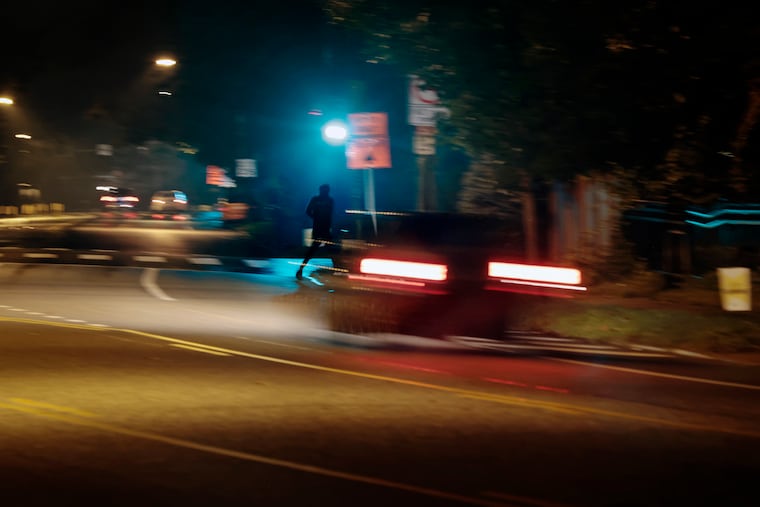Fake, expired, and obscured car tags threaten public safety | Editorial
The tactic has not only been adopted by those who want to avoid a traffic ticket. It has also become a tactical choice for would-be criminals.

Over the last year, in more than 30,000 cases captured by the city’s traffic cameras, drivers got away with speeding down Roosevelt Boulevard. In at least 240 incidents, vehicles recklessly reached more than 100 mph on a road lined with residences, places of worship, and schools.
How did these motorized scofflaws get away with it? By using fake, obscured, or missing license plates.
Experts say that beyond posing a danger to pedestrians and other drivers, those with missing plates often want to do more than just avoid a traffic ticket. Driving without proper tags has also become a tactical choice for would-be criminals — like the suspected killers of 14-year-old Nicolas Elizalde — whose vehicles become harder to trace.
Local and state officials need a comprehensive strategy to end this trend and ensure public safety on multiple fronts.
» READ MORE: Speed cameras are saving lives and should stay | Editorial
Some have already begun to take steps against the problem. Pennsylvania courts ruled last year that obscured plates serve as grounds for a traffic stop. Meanwhile, the Philadelphia Parking Authority, which is under new leadership, has begun a campaign to ticket and tow plate-free vehicles. That’s a welcome sign, but given the parking authority only patrols certain neighborhoods, more needs to be done.
City and state officials should consider working together to pressure Delaware, which issued more than 150,000 temporary tags last year — a very high number for a state with fewer than 400,000 households — into toughening up its requirements for temporary tags. Fake and photocopied Delaware tags have become a problem for many of that state’s neighbors. A concerted effort by regional leadership to lobby Dover could help turn the tide.
Another move that might help is adding automated license plate readers. This would allow police to identify cars with fake tags and take appropriate action. Harrisburg should also consider increasing the fee for obscured plates, which is only $100. The current penalty clearly hasn’t been a deterrent, especially when speed camera fines start at $100. Considering the level of intent that goes into obscuring a plate, there’s room to make that fine much tougher.
What is likely to have little effect is what some local police advocates are asking for, which is a repeal of the city’s driving equality law. The measure, which took effect in March 2022, restricts the police from making traffic stops over minor issues, including an expired inspection sticker or items hanging from the rearview mirror — the kind of stops that disproportionately impact drivers of color.
The law has become the subject of debate during the mayor’s race. Jeff Brown has said he was for it while campaigning in West Philly; he said the opposite while on the stump in the Northeast. Even Helen Gym, the most progressive candidate in the race, declined to give the bill her unequivocal support when meeting with voters in the Northeast.
» READ MORE: Philly must get serious to prevent traffic deaths | Editorial
Even without the law, reporting by The Inquirer showed that bogus license plate arrests were rare in the city, with only 57 cases between 2017 and 2022, many of which came from state troopers or suburban officers. If Philadelphia police view the law as a “sign to back off,” as some have claimed, they aren’t listening to its author.
At a recent news conference, Councilmember Isaiah Thomas — who drafted the driving equality measure — urged police officers to perform more stops for genuinely dangerous behavior on the road. Thomas also called on officers to continue to cut down on the pretextual stops referenced in his bill.
Driving equality isn’t to blame for the increase in fake plates. It is a phenomenon that spans the entire I-95 corridor. New York City, Baltimore, Washington, D.C., and other cities are all dealing with a surge in people opting out of displaying legal plates. Besides saying they want to avoid speeding tickets, offenders often cite a desire to avoid paying tolls.
Whatever the motivation for would-be speedsters and toll dodgers, those who don’t display license plates put every Philadelphian at risk.